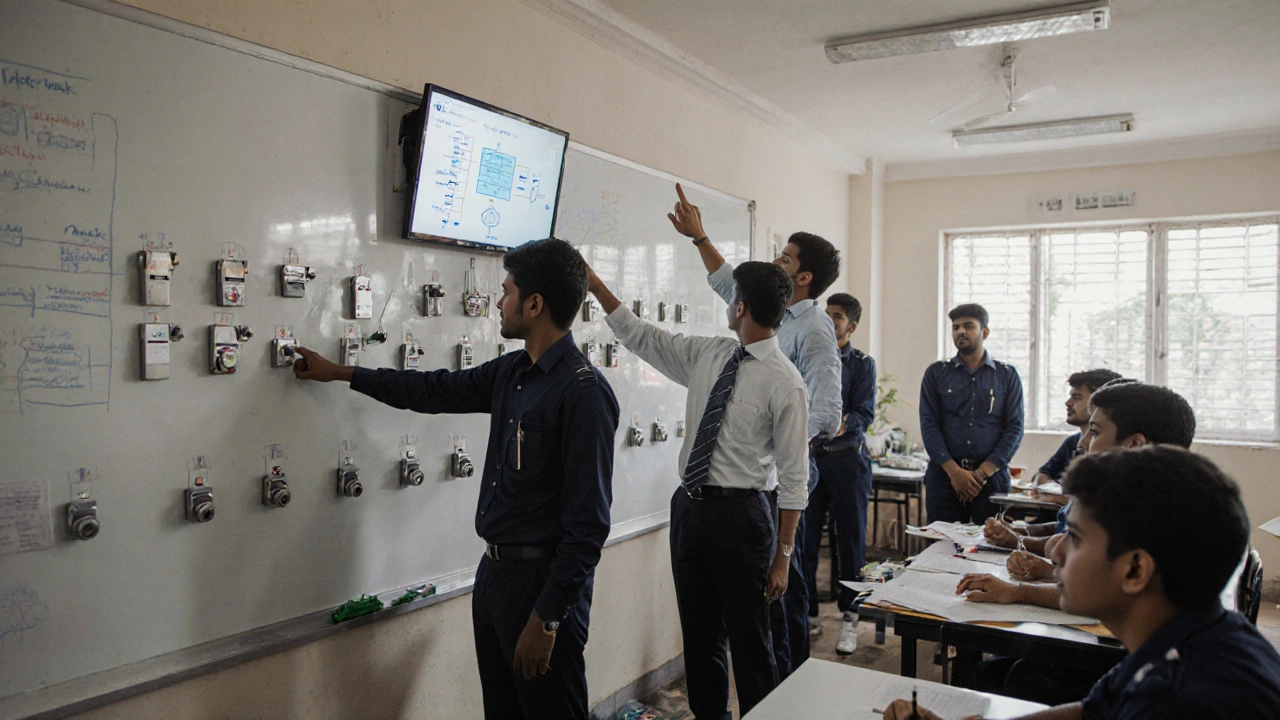Locksmith Salary Calculator
Earnings Potential Calculator
Find out how your skills compare to the evolving locksmith market in India
Locksmithing isn’t what it was ten years ago. If you think it’s still about picking pins and cutting keys on a bench, you’re already behind. In India, the trade is shifting fast - and those who adapt are thriving. Those who don’t? They’re fading out.
Smart locks are replacing traditional keys
By 2025, over 40% of new homes and offices in India’s top cities - Delhi, Bangalore, Mumbai - are being fitted with smart locks. Brands like Godrej, Yale, and local players like Loxone and Easylife are selling more electronic locks than mechanical ones in urban areas. These locks work with apps, biometrics, or NFC cards. No physical key needed.
That means a traditional locksmith who only knows how to cut keys or replace cylinders is losing work. But here’s the twist: the demand for skilled technicians who can install, repair, and program these smart systems is rising. Companies like Assa Abloy and Honeywell now hire technicians with certification in electronic access control. In Pune, a locksmith trained in smart lock systems earns 2.5x more than one who only works with brass keys.
Locksmith training in India is changing
Most old-school locksmith courses in India still focus on manual tools: pick sets, tension wrenches, key duplicators. That’s fine for rural areas or small towns where homes still use cylinder locks. But in cities, training centers that don’t teach digital locks are falling behind.
Today’s best programs - like those offered by the National Skill Development Corporation (NSDC) or private institutes in Hyderabad and Chennai - include modules on:
- Installing and troubleshooting Bluetooth and Wi-Fi enabled locks
- Understanding Z-Wave and Zigbee protocols
- Managing multi-user access logs and audit trails
- Dealing with firmware updates and cloud-based lock systems
- Basic cybersecurity for access control devices
One graduate from the NSDC-certified Locksmithing Diploma in Jaipur now runs a small business servicing 80+ smart locks across Gurgaon. He didn’t learn how to pick a lock until his third month of training - he spent the first two learning how to reset a Yale Assure Lock via the app.
Locksmiths are becoming security consultants
It’s not just about fixing locks anymore. Homeowners and small businesses want advice. They’re asking: “Should I go with a fingerprint lock or a keypad?” “Is this system hackable?” “Can I control it when I’m out of town?”
Locksmiths who can answer these questions - and recommend the right system for the budget - are in high demand. In Bengaluru, a technician who adds a 15-minute security assessment to every job sees 60% more repeat customers. That’s because people trust someone who explains the risks, not just someone who replaces a part.
Many now carry tablets to show clients diagrams of different lock types, compare prices, and even demo apps live on the spot. This isn’t salesmanship - it’s professionalism. And it’s becoming standard.

The rise of the mobile locksmith
People don’t want to wait days for a locksmith anymore. They want someone to show up in 30 minutes. That’s why mobile locksmith services are exploding.
Apps like LockMate and QuickLock now connect users with certified technicians in over 200 Indian cities. These technicians don’t just carry tools - they carry diagnostic tablets, battery-powered key programmers, and spare modules for popular smart locks.
In Kolkata, a mobile locksmith who specializes in electronic locks can do 12 jobs a day. A traditional one doing only key cuts and cylinder replacements? Maybe 4. The mobile model isn’t just convenient - it’s more profitable.
What happens to the old-school locksmith?
It’s not all doom. There’s still a huge market for traditional locksmithing in smaller towns, villages, and older buildings. Many homes in Uttar Pradesh or Bihar still use old mortise locks. Schools, temples, and government offices haven’t upgraded.
But here’s the reality: that market is shrinking. And it’s not growing. Meanwhile, the digital side? It’s growing at 28% year-over-year, according to a 2024 report by the Indian Locksmiths Association.
If you’re still learning only how to cut keys on a manual machine, you’re training for a job that will be rare in five years. The future belongs to those who learn to work with both - the old and the new.

How to get ready for the future
Here’s what you need to do right now if you’re serious about locksmithing in India:
- Get certified in electronic access systems - look for NSDC or ASSA ABLOY-approved courses.
- Buy one smart lock for practice - a Yale Real Living or a Godrej Digital Lock - and learn how to reset it, update firmware, and recover from lockouts.
- Learn basic app troubleshooting. Most issues aren’t hardware - they’re connectivity or user errors.
- Start offering free security checkups. Even a 10-minute walkthrough builds trust.
- Join a mobile locksmith network. It gives you instant customers and a steady income stream.
Don’t wait for someone to tell you it’s time to change. The market is already changing. The question isn’t whether you’ll adapt - it’s whether you’ll adapt before your competition does.
What’s next for locksmithing in India?
By 2030, most locksmiths in urban India won’t carry a traditional key blank. They’ll carry a diagnostic tool that reads lock firmware, a portable charger for battery-powered locks, and a tablet with remote access to cloud-based systems.
Some may even start offering home security audits as a full service - combining locks, cameras, alarms, and smart lighting. Locksmiths who become security integrators will be the ones who survive - and thrive.
The future of locksmithing isn’t about metal and pins anymore. It’s about software, sensors, and service. The tools have changed. The skills have changed. The job? It’s better than ever - if you’re ready for it.
Is locksmith training still worth it in India?
Yes - but only if the training includes modern systems. Basic key-cutting courses won’t prepare you for today’s market. Look for NSDC-certified programs that cover smart locks, electronic access control, and mobile service protocols. The demand for skilled technicians is growing fast, especially in cities.
Can I start a locksmith business without formal training?
You can technically start without formal training, but you’ll struggle. Customers in urban areas expect certified technicians. Insurance companies and property managers often require proof of certification. Plus, without training in smart locks, you’ll miss out on 70% of new jobs. Formal training gives you credibility, better tools, and access to supplier discounts.
How much does locksmith training cost in India?
Basic courses cost between ₹5,000 and ₹15,000. Advanced training in smart locks and electronic systems ranges from ₹25,000 to ₹50,000. NSDC-certified programs are often subsidized, bringing the cost down to ₹8,000-₹12,000. Some institutes offer payment plans or government scholarships for skill development.
Do I need a license to be a locksmith in India?
There’s no national license required, but some states like Delhi and Maharashtra have local registration rules for locksmiths. Most banks, gated communities, and corporate clients require proof of training or certification. Even if the law doesn’t require it, clients will - so certification is practically mandatory.
What’s the average income for a locksmith in India?
A traditional locksmith earns ₹15,000-₹25,000 per month. A technician trained in smart locks and mobile service earns ₹40,000-₹70,000, especially in metro cities. Those who build a brand and offer security audits can hit ₹1 lakh+ per month. Income depends on skills, location, and whether you work for yourself or a company.




